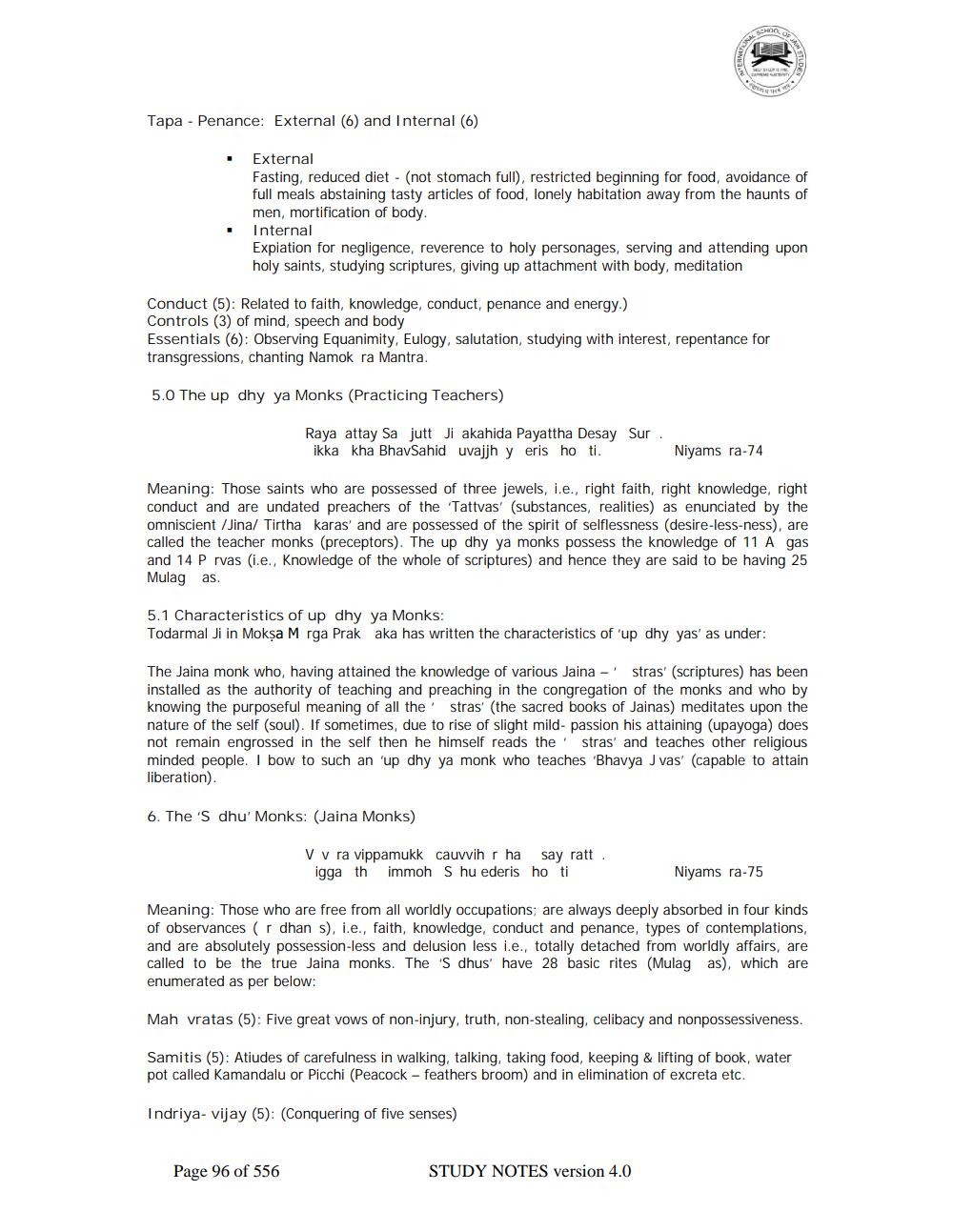________________
Tapa - Penance: External (6) and Internal (6)
External Fasting, reduced diet - (not stomach full), restricted beginning for food, avoidance of full meals abstaining tasty articles of food, lonely habitation away from the haunts of men, mortification of body. Internal Expiation for negligence, reverence to holy personages, serving and attending upon holy saints, studying scriptures, giving up attachment with body, meditation
Conduct (5): Related to faith, knowledge, conduct, penance and energy.) Controls (3) of mind, speech and body Essentials (6): Observing Equanimity, Eulogy, salutation, studying with interest, repentance for transgressions, chanting Namok ra Mantra.
5.0 The up dhy ya Monks (Practicing Teachers)
Raya attay Sa jutt Ji akahida Payattha Desay Sur. ikka kha BhavSahid uvajjh y eris ho ti.
Niyams ra-74
Meaning: Those saints who are possessed of three jewels, i.e., right faith, right knowledge, right conduct and are undated preachers of the Tattvas' (substances, realities) as enunciated by the omniscient /Jina/ Tirtha karas' and are possessed of the spirit of selflessness (desire-less-ness), are called the teacher monks (preceptors). The up dhy ya monks possess the knowledge of 11 A gas and 14 P rvas (i.e., Knowledge of the whole of scriptures) and hence they are said to be having 25 Mulag as.
5.1 Characteristics of up dhy ya Monks: Todarmal Ji in Moksa Mrga Prak aka has written the characteristics of 'up dhy yas' as under:
The Jaina monk who, having attained the knowledge of various Jaina -' stras' (scriptures) has been installed as the authority of teaching and preaching in the congregation of the monks and who by knowing the purposeful meaning of all the stras' (the sacred books of Jainas) meditates upon the nature of the self (soul). If sometimes, due to rise of slight mild- passion his attaining (upayoga) does not remain engrossed in the self then he himself reads the stras' and teaches other religious minded people. I bow to such an 'up dhy ya monk who teaches 'Bhavya J vas' (capable to attain liberation)
6. The 'S dhu' Monks: (Jaina Monks)
V v ra vippamukk cauvvihr ha say ratt. igga th immoh S hu ederis ho ti
Niyams ra-75
Meaning: Those who are free from all worldly occupations; are always deeply absorbed in four kinds of observances ( r dhan s), i.e., faith, knowledge, conduct and penance, types of contemplations, and are absolutely possession-less and delusion less i.e., totally detached from worldly affairs, are called to be the true Jaina monks. The 'S dhus' have 28 basic rites (Mulag as), which are enumerated as per below:
Mah vratas (5): Five great vows of non-injury, truth, non-stealing, celibacy and nonpossessiveness.
Samitis (5): Atiudes of carefulness in walking, talking, taking food, keeping & lifting of book, water pot called Kamandalu or Picchi (Peacock - feathers broom) and in elimination of excreta etc.
Indriya- vijay (5): (Conquering of five senses)
Page 96 of 556
STUDY NOTES version 4.0




